


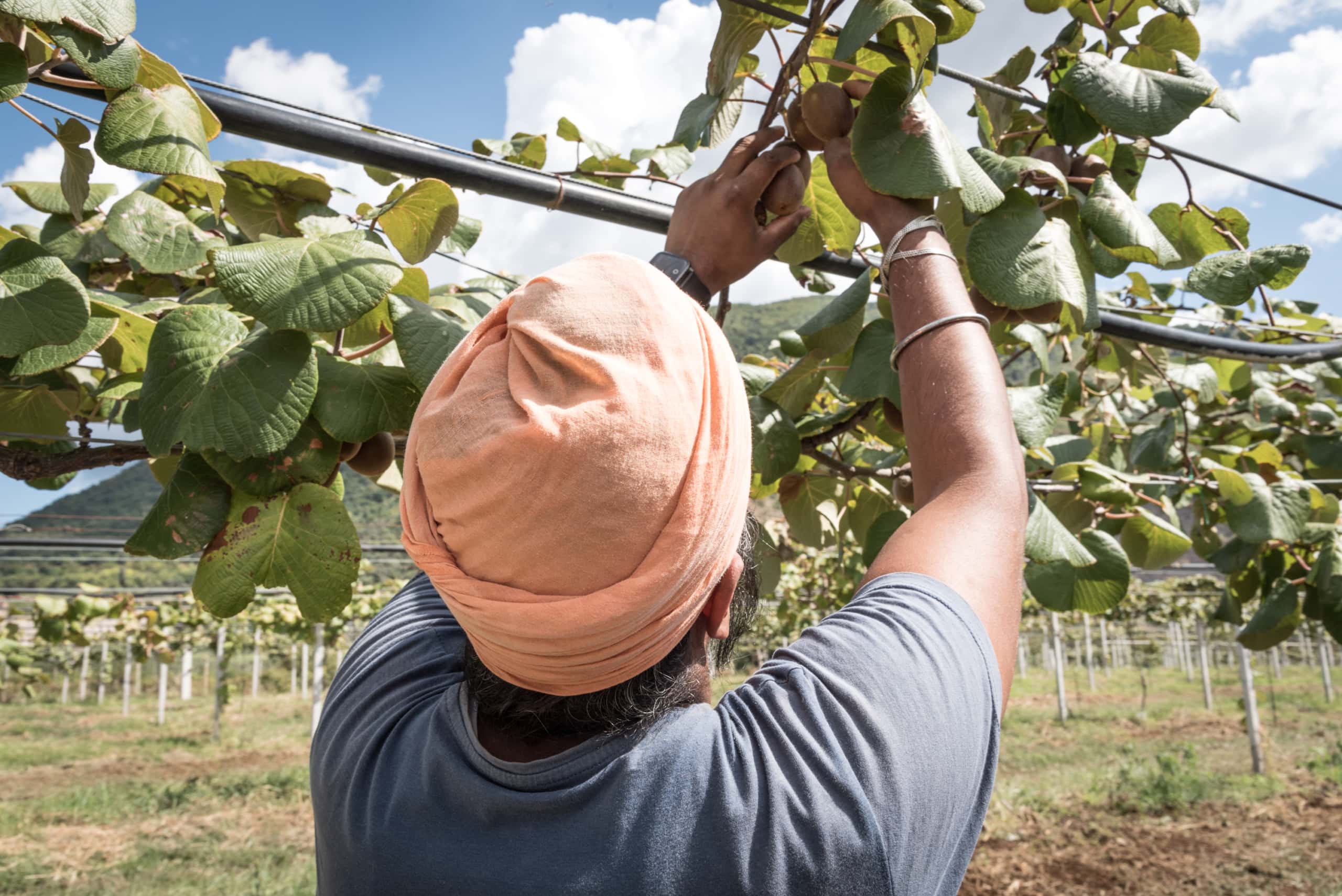
“The supervisor shouts at me all the time, calls me horrible names and complains about me to the boss. She says that I am not fast enough”.
The large man sitting opposite us shrinks as he tells about daily life on one of Italy’s largest kiwi orchards. Tears roll down his sunburned cheeks.
“She films me on her phone and sends the footage to the boss if I just get my water bottle or stop for a moment to get some dirt out of my eye. Then I won’t get paid that day’.
The broken man on the rickety café chair on the edge of the central square of the Cisterna di Latina, just south of Rome, is Gurjinder Singh.
Get an insight into the methods used in this study and the data obtained here.
After fourteen years as a farm worker in Italy’s scorched kiwi fields, he is a changed man.
The last three years in particular have cost him both his health and his equilibrium.
Shortly before Danwatch met Gurjinder Singh, he had managed to escape from a large kiwi orchard in Lazio. Where he was subjected to constant harassment and surveillance.
Although he has moved on, 50-year-old Gurjinder Singh, is reluctant to give his real name.
He also dares not let us publish the name of the orchard in fear of what the orchard owner could do to him. For example, get him fired from his new workplace.
“My family and children are in India, and they need all the money I can send them”, he says.
In colaboration with the Italian center for investigative journalism, IrpiMedia, and independent Indian newspaper The Wire, Danwatch has been in Lazio, south of Rome, to investigate the conditions in the Italian kiwifruit industry.
Midway between the ruins of Rome and the white beaches of the Mediterranean, lies one of Italy’s most fertile agricultural areas, where, according to the UN Food and Agriculture Organization (FAO), kiwifruit production has steadily increased over the past twenty years, supplying a great portion of the globe with the juicy fruit.
But Italy's sweet kiwi success is built on a bitter reality.
Several kiwi workers from orchards across Lazio clearly illustrate how Indian migrant workers from Punjab are subjected to debt slavery, underpayment and exploitation to secure fresh supplies of the small fuzzy fruit for the rest of the world, including Danish supermarkets.
And this picture is confirmed by local trade unions, police authorities and experts interviewed by Danwatch, IrpiMedia and The Wire.
Researchers, NGOs and trade unions estimate that at least 30,000 Indian migrants work in Lazio's orchards, toiling 10-11 hours a day, six days a week, for an hourly wage of around 5-6 euros. This is just over half of the minimum wage.
Most migrant workers in Lazio come from Punjab in northern India.
But to get that far, they typically have to pay between 100,000 and 135,000 euros to get to Italy - a debt that typically takes them between three to four years to repay.
This makes it very difficult to leave the kiwi orchard, no matter how inhumane the conditions are.
Trade unions, NGOs and independent experts on human trafficking say that conditions in the Italian kiwifruit industry can be described as modern slavery in several respects.
"The wage conditions and that workers must put themselves in debt to travel to Italy are both elements of modern slavery," said Sine Plambech, an expert on human trafficking and senior researcher at the Danish Institute for International Studies (DIIS).
"If a migrant worker is trapped in a situation where they cannot afford to quit, due to debt, or because they are controlled by their employer, it is definitely modern slavery," says Natalia Ollus, senior researcher specializing in human trafficking and director for the European Institute of Crime Prevention and Control in Helsinki.
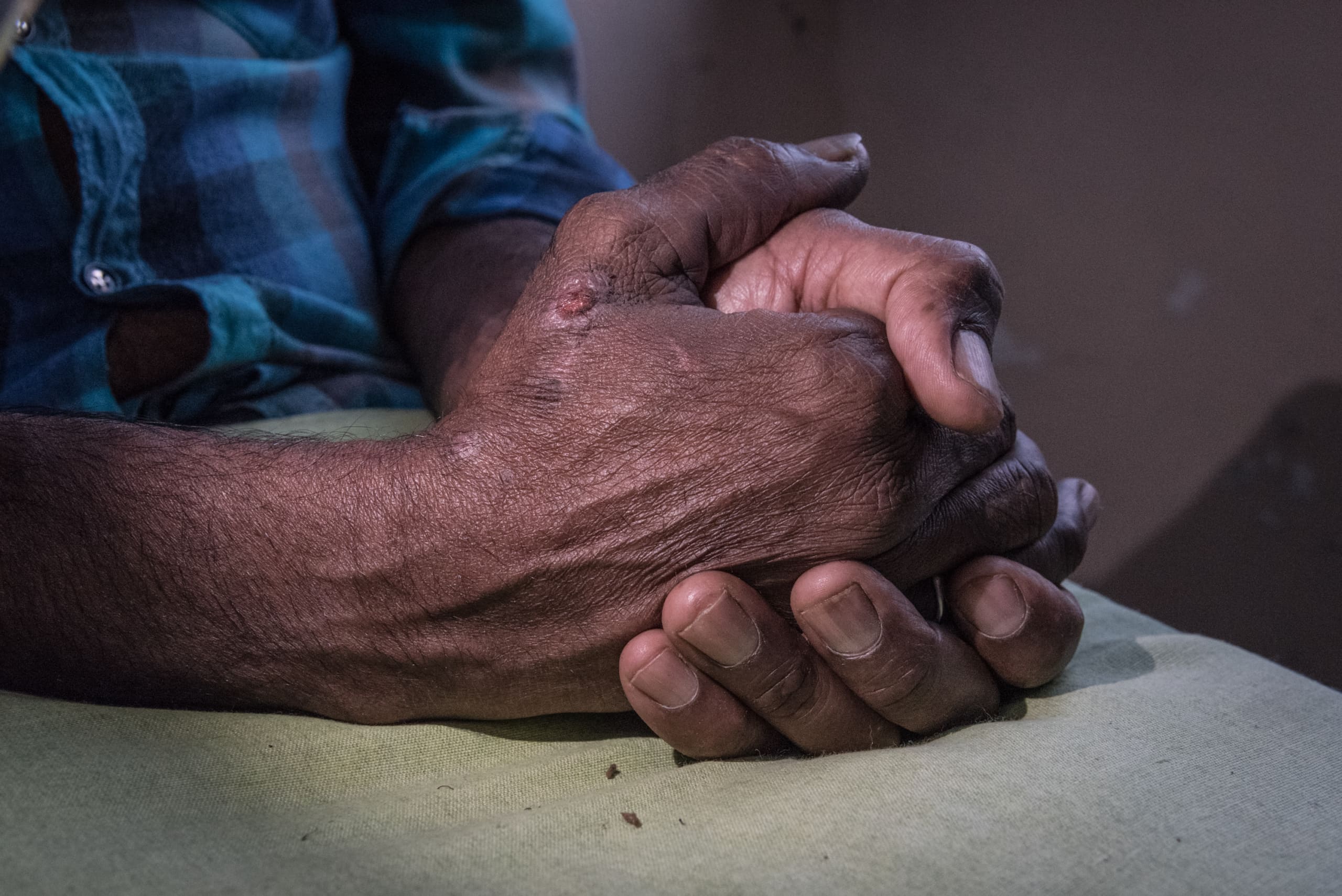
Gurjinder Singh comes straight from the field to speak with us and apologizes for not being able to clean off the dirt that is ingrained into his hands.
"I scrub them with shampoo and lemon, but I just can't get it off," he says, hiding his hands that look just as wounded as his soul.
Just two days earlier, Gurjinder Singh started a new job in the provincial capital Cisterna di Latina with a different orchard owner, who he hopes will treat him better and keep his promise of an employment contract, an hourly wage of 5-6 euros and an eight-hour working day.
Several of the 50-60 other farm workers there have told him that it is a bearable place. But he is not sure whether or not this is true.
As Gurjinder Singh talks about life as a kiwi worker, two of his new colleagues sit next to him and nod. Because his story is their story too.
Ten different kiwi workers revealed to us, with little variation in their stories, how orchard owners systematically manipulate their pay slips and do not pay the agreed minimum wage, which is around nine euros an hour.
The trick is really quite simple, they explain.
Every month, employers record far fewer days and hours on their pay slips than the employees actually work. Instead, part of their hourly wage is paid to them on the side, at a much lower rate and often in cash.
Their average hourly wage then ends up being 5-6 euros per hour - a third less than the wage the orchard owners should have paid them.
And in that way, employers don't have to pay full wages for labour and they don't have to pay a lot of taxes. Giovanni Gioia, president of the La Confederazione Generale Italiana del Lavoro (CGIL) trade union in Lazio, explains.
That he estimates that the scam costs the Italian state billions in lost tax revenue every year, but there are no firm figures.
His office in Latina is plastered with posters baring red slogans and raised fists. He says that payroll fraud is widespread throughout the Italian agricultural sector and that it has been very difficult for the authorities and trade unions to tackle.
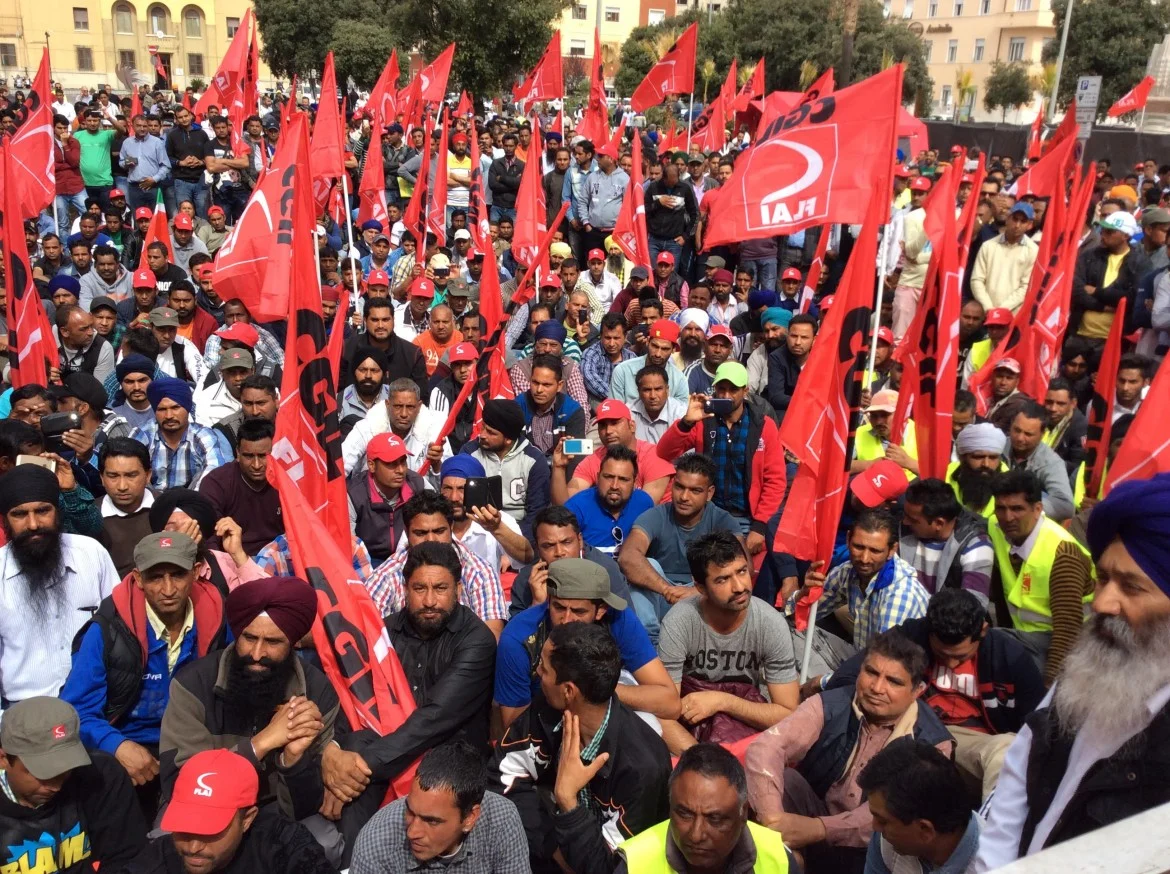
"Up to 90% of the payslips we see are fake. For example, orchard owners will claim three days of work per week at 6.5 hours per day, but in reality it is very different. The vast majority of farm workers work six or seven days a week from sun-up to sun-down", says Giovanni Goia.
The many workers we spoke to unanimously confirmed that working hours are typically 11-12 hours a day, six days a week.
Haning in his office in the provincial capital Latina, Giovanni Gioia's pride and joy is a large photograph from 2016 when GCIL motivated thousands of Indian farm workers to take to the streets to protest their conditions.
Since then, on average wages have risen from 3 euros to 5.5 euros. But otherwise, the conditions are pretty much the same, he says.
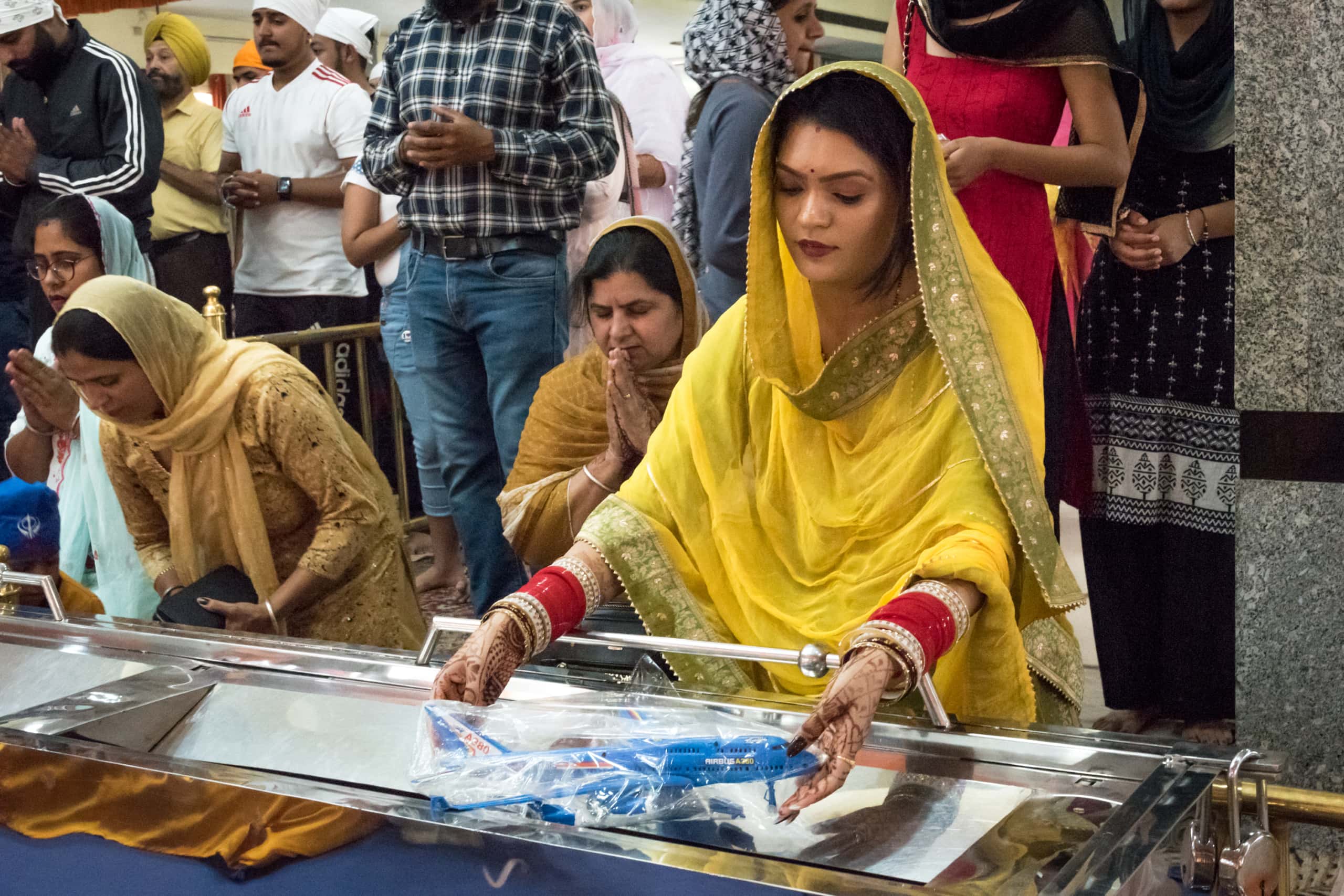
Like Gurjinder Singh, the rest of the Indian farm workers who tend to, water, pick, and pack the juicy kiwis in Lazio come from the Indian state of Punjab.
We went to northern India to visit some of the villages where families send between 400 and 500 sons, husbands and fathers every day to work in the US, Canada and Europe.
Although Punjab is known as India's breadbasket, the economic prosperity of recent decades has not reached the remote villages, and money sent home by migrant workers plays a major role, especially for poor farmers.
It's Sunday in the grand Shaheed Baba Bihal Singh temple in Talhan village outside Jalandhar, Punjab's third largest city.
From all over, turbaned men, women in colorful saris, and families with children flock to the temple to participate in the daily prayer.
Inside, between the temple pillars, several of the children play with the brightly coloured model airplanes they bought at the market outside the temple. 1.70 euros for the smallest, 5.30 for the most expensive.
Most of the airplanes are still wrapped in crackling cellophane, because they're not meant to be played with. The planes are to be given as offerings at the temple to ensure that an older brother, father or uncle can get one of the coveted visas to the West. For the skilled, it's the US and Canada, for the unskilled it's Portugal and Italy.
One by one, the colourful airplanes are piled in front of the flower-covered dais where the temple's priest Baljit Singh is about to preach.
"Every day, visitors give up to 1,000 airplanes as offerings, on Sundays there can be up to 3,000-4,000," he says.
The planes symbolize the dream of travel, the dream of a better life in the USA or Europe. A dream which is shared by almost every child and adult we spoke to in the village.
And it's a dream that many are making a reality: the Indian media estimate that Italy alone is home to more than 220,000 workers from Punjab.
"People see that offering up an airplane works for others. And then they think, why not try it themselves," says the priest.
"Does it work? Yes, of course it works," he says with a smile. "If you offer an airplane with sincere faith in God and in yourself, it will work".
In Punjab's villages, large villas testify to the prosperity of some of the families who have sent their sons and daughters to the West. One villa is known as Italy waleya di Kothi, "The House of those who live in Italy", another as England Wale "The Englanders".
But Baljit Singh knows that not all dreams become a reality in Europe.
"I am aware of that. But it has become our culture to travel", he says, while emphasizing that it is a tradition that it saddens him.
"I don't think that those who are doing well here should leave. But there are many young people who have no future here. Even if you are well educated, it is very difficult to find a job. That's why people leave. They hope for a brighter future and better quality of life," he says.
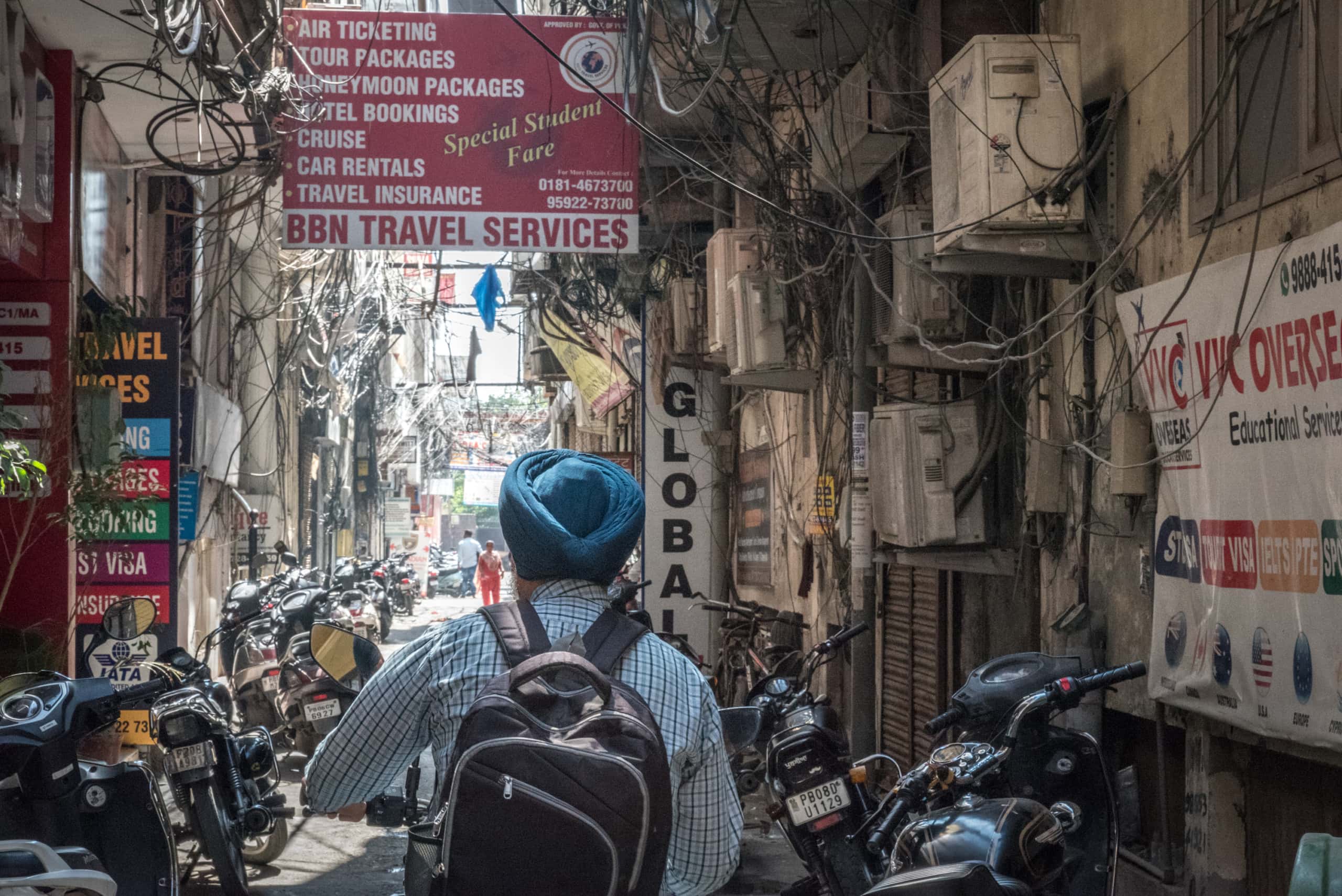
But it's one thing to offer model airplanes at the temple, it's quite another to leave.
And most people will need a little more practical help than what the priest can offer.
In the provincial capital of Jalandhar, home to around one and a half million people, travel agents in their hundreds advertise trips to Europe with a promise of a job and a bright future.
We got in contact with five travel agencies to see what they charge for sending a young man to Italy.
We tell the travel agents that we would like to buy a flight for the journalist's brother, Manjit Singh, and ask them how much it would cost to fly him and how it would work if, for example, he wanted to work at an Italian kiwifruit farm.
All five agents are very eager to arrange flights for the journalist's brother, but the prices and practical details of the trip vary dramatically. At one agency, the agent wants at least 13,5 lakh rupees to get a visa to the Schengen area, which includes Italy.
This is equivalent to approximately 17,000 euros.
"If your brother gets a Schengen visa, he can travel freely within that region, including Italy", the agent promises.
Another travel agent wants 8.5 lakh rupees to send Manjit Singh to Malta. This is equivalent to approximately 10,000 euros. How Manjit gets from Malta to Italy would be up to him, the agent explains.
However, none of the travel agencies can promise that Manjit will secure a job if he makes it to Italy.
"He'll have to get one himself when he gets there", they all respond.
Despite the exorbitant price of a visa and airfare to Italy, the Indian government estimates that around 487,000 young people left Punjab to work abroad between 2016 and February 2021.
It is usually a family initiative, often with the eldest son designated to go and secure a prosperous future for the whole family, according to the several families we meet in Punjab. And several of the Indian kiwifruit workers we interviewed in Lazio confirm this too.
Sometimes the worker's extended family manages to raise the money, but otherwise young people borrow money from the richest families in the village or from loan sharks. Often by mortgaging the family's property, they explain.
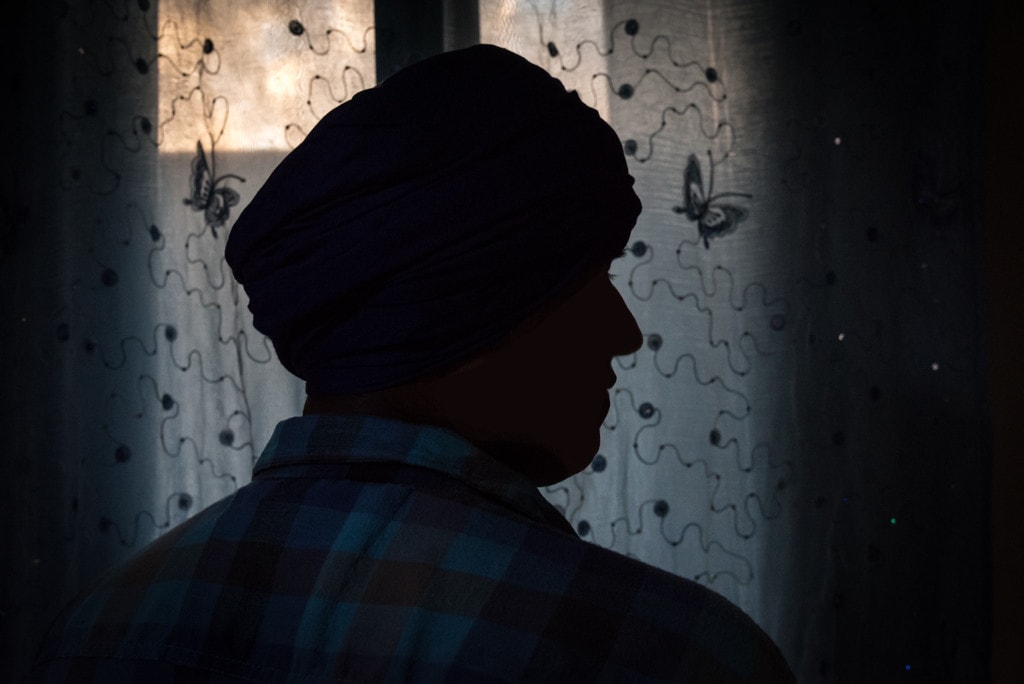
For Gurjinder Singh, it cost more than 100,000 euros to reach Italy. A debt that took him almost four years to repay.
In the square in Latina, he says he had no choice. It was his family who decided that he went, even though he already had a wife and four children at the time.
Today, almost 16 years later, he still has no choice, he says. Due to COVID-19, he has not been able to see his family for the past three years, and for the thirteen years before that, he had no money to travel home. It has not been possible to verify whether this is true. But now in the spring of 2023, things are looking up for him and he expects to be able to travel to Punjab for a holiday.
However, once his holiday is over, the Italian kiwi orchards will call to him once more, he says.
"I have to return to Italy. I come from a very poor family. My three oldest children are married now, but I still have my wife and an 18-year-old son who lives at home and is dependent on my income", he says.
Today Gurjinder Singh is debt-free, but all the Indian workers we spoke to in Lazio and Punjab said they had to pay between 14,000 and 18,000 euros to get to Italy.
And no matter where the money comes from, the obligation to pay back their debt is the same, they say.
Otherwise, the worker's family back home in Punjab risks paying back extortionate interest to a moneylender, or if things go terribly wrong, they risk losing their home and land. And on top of that, it is also a matter of honour to pay back debt.
Like Gurjinder Singh, all the Indian kiwifruit workers we met spent between three and four years paying off the loans they took to get to Italy.
This has prompted trade unionists like Giovanni Goia and human trafficking experts to talk about debt slavery.
"Modern slavery is no longer about being chained and forced against one's will, in the manner of the transatlantic slave trade. Today, it concerns vulnerable people who have, for example, gotten into debt and cannot leave their job, even if they are being exploited", says Sine Plambech, Senior Researcher at DIIS.
No posts
Someone who experienced an extreme form of modern slavery is Balbir Nikah Singh, now 49, whom we meet while in the provincial capital of Cisterna di Latina.
Today he lives in a single room annex with a kitchen and bathroom in Latina. But he has never had it so good. For more than six years, he admits he was a "slave" on a farm near the small coastal town of Borgo Sabotino.
When his long days as a farm worker were over, Balbir Singh lived in an old caravan with no light, heat, water or gas.
"If I wanted to bathe, I had to use the hose we had in the barn - the same one I used for the cows. And if I was hungry, I had to rummage through the family's garbage bin or eat the leftover food they fed to the farmyard chickens and pigs," says Balbir Nikah Singh.
His story is varified by several other sources who have had similar experiences, as well as a number of court documents and photos which Danwatch have viewed.
But worst of all, the salary that would have secured his own stay in Italy and enabled him to bring his wife Surinder Kaur and their two daughters to Europe became less and less.
"I dreamed of a bright future for me and my family. My wife was supposed to come to Italy too, but that dream was crushed by my employer", says Balbir Singh
"I worked 12-13 hours every single day, seven days a week. I never had a day off and the salary I received was getting smaller and smaller. Some months I only got 50 or 100 euros. In the end, there were months when I didn't get paid at all".
To this day, the former primary school teacher from Punjab is ashamed that he put up with those conditions. But the farm owner had taken his passport. And without a valid residence permit, he could not travel anywhere.
"Where would I go without a passport and papers. And what's more, the son in the house threatened to kill me if I tried to run away".
Fortunately, Balbir Nikah Singh eventually managed to escape.
Before dawn on the morning of March 17, 2017, the Italian police, the carabinieri, stormed the farm in Borgo Sabotino arresting the entire family and freeing Balbir Singh.
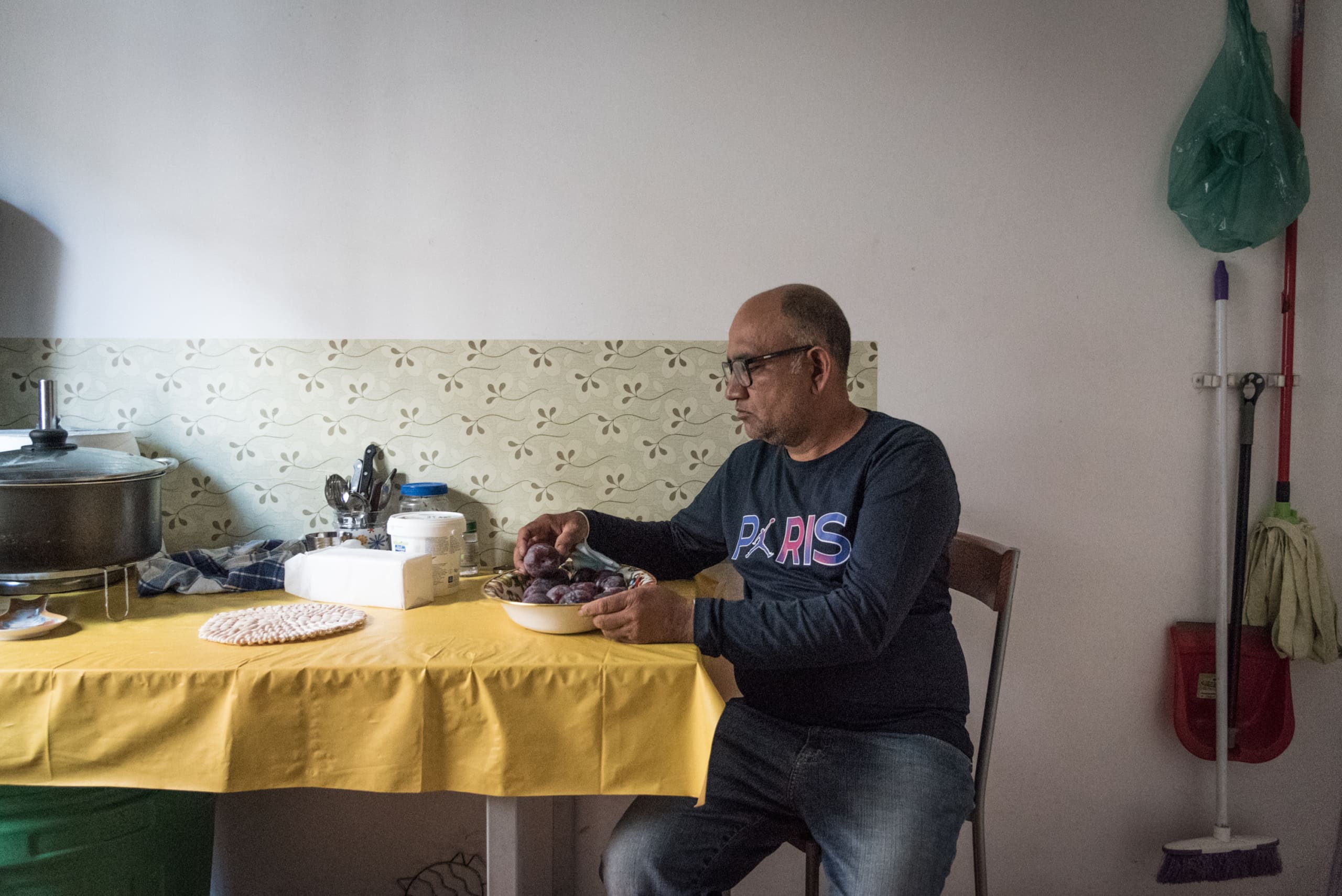
No posts
Today, Balbir Singh is still a farm worker, but now on a kiwi orchard, where despite everything conditions are better. The working days are still many and long, and hourly wages do not exceed 5.50 euros.
But he is the first migrant worker in Italy's history to be granted a permanent residence permit because of what he has endured.
And he is one of the first Indian migrant workers ever to take his former employer to court, both to seek justice for the humiliation he suffered and to raise awareness of the plight of migrants.
"I really hope that even my worst enemy will never have to go through what I have been through", he says.
In addition, he also hopes that his former employer will be forced to pay him back for all months that they did not pay his wages.
"Today, I am a free bird and I am not giving up", he declares. "Your mother gives you the gift of life, but what you achieve with your life depends solely on your personality and your own actions".
Although Balbir Nikah Singh's fate led him down an extreme path, his experience shows how vulnerable Indian migrants are when they end up on an Italian orchard, often without knowing the language or their rights.
Marco Omizzollo, Professor of Social Anthropology and Migration at La Sapienza University in Rome, specializes in the conditions of Indian migrants in Lazio.
As well as researching this field, he has worked undercover in the area.
For three months, he lived and worked with the Indian migrant workers in the village of Bella Farnia, south of Latina, and has since published several books about his experiences and the system of travel agents, orchard owners and others who make money from exploiting the poor workers from Punjab.
This has made him quite unpopular and, after a series of threats from who he refers to as the 'Italian agricultural mafia', he now lives and works at a secret address.
Therefore, our meeting with him takes place in Parco Europa in Aprila, one of the smaller towns in the area.
"The exploitation of Indian migrant workers is severe and widespread. It is mainly agricultural workers who are exploited, but many of them are also victims of modern human trafficking", says the Italian researcher.
"They are lured to Lazio by people who make large sums of money to bring them to the area, and most of the time the workers only get a fraction of what they have been promised", he says.
In addition, many of the Indian workers in Lazio are subjected to both physical and psychological violence, his research shows.
However, it is not only in the kiwifruit industry or in Lazio province that the exploitation of guest workers takes place.
According to Urmila Bhoola, the UN Special Rapporteur on modern slavery, up to 400,000 agricultural workers in Italy are at risk of exploitation.
This is according to a comprehensive report she prepared for the UN Human Rights Council on the issue. She also concludes that almost 100,000 live in what she describes as "inhumane conditions".
Marco Omizzolo has been involved in migrant workers' rights for more than a decade and was knighted in 2019 for his "courageous work" in exposing working conditions in Lazio.
He believes that conditions have improved slightly in recent years, particularly in terms of pay. But at the same time, the exploitation of workers has become more sophisticated.
"For example, some orchard owners pay yo-yo wages, a term describing an employer who pays wages in full but requires their workers to withdraw 200-300 euros the next day and return it to them in cash".
As CGIL union leader Giovanni Goia confirms, orchard owners have been adept at adapting to increasing controls and making areas of their exploitation invisible.
However, he agrees with Omizzolo that conditions have slightly improved in recent years.
After interviewing the ten Indian kiwi workers about the conditions they work under, the
IrpiMedia, The Wire and Danwatch were eager to talk to some of the orchard owners who have been accused of underpaying workers, manipulating their pay slips, verbally abusing them, shaming them and in some cases filming and firing the Indian employees.
However, despite several attempts, it was not possible to get in touch with the owners or to even get a tour of the orchards.
"Call a different number". "Call again" "Come again another day". "The owner's not home".
"There's no one else who can talk to you" is their answer, when we call and, in many cases also when we go to the address to speak with them.
However, according to the UN Principles on Human Rights and Business, responsibility does not end there. According to the guidelines, all companies in the supply chain are jointly responsible for any negative impacts on human rights and the environment.
The next step in the supply chain are a series of Italian wholesalers who buy kiwifruit from the many orchards in Lazio and export them to the rest of the world.
The workers we spoke to are employed on kiwi orchards who, among others, supply Apofruit, Kiwi Pontino, Salvi, Zani Granfrutta and Zeolifruit. All of whom supply kiwifruit to Danish supermarkets.
However, none of these five companies wanted to be interviewed.
THE FACTS
According to the UN Guiding Principles on Business and Human Rights (UNGPs), every link in the supply chain is responsible for what goes on in Italian orchards. Below the diagram, you can read the full reactions of the individual wholesalers and Danish supermarket chains selling kiwifruit from Lazio.
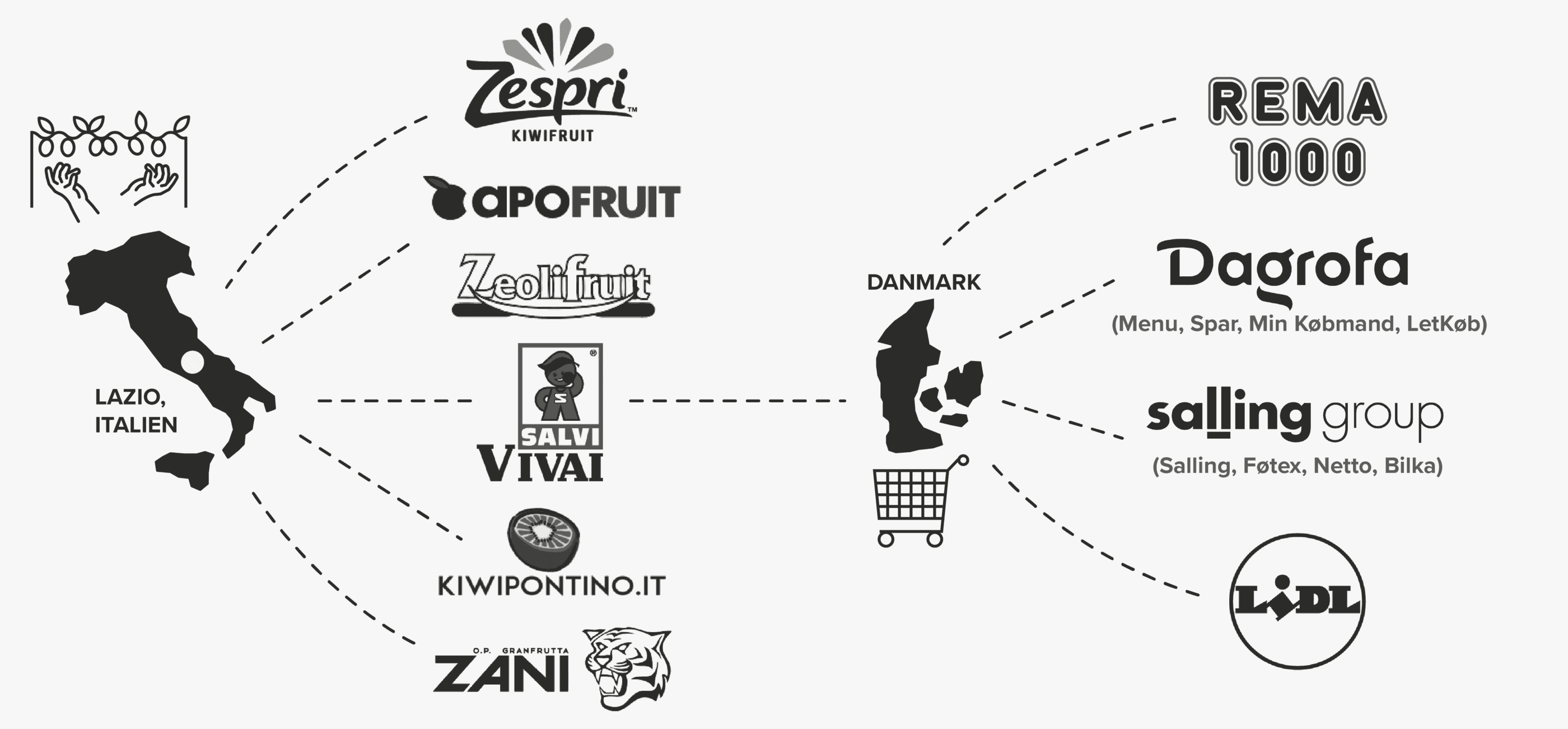
Apofruit denies all responsibility and in short points out that all their suppliers have the GRASP certification, which sets a number of requirements for transparency and working conditions.
Zeolifruit refuses to cooperate and Salvi did not respond to our inquiries at all.
At Zani Granfruttai, however, they were more responsive.
Quality Manager Enrico Foschin responds in an email that they carry out random checks on the 80 percent of their suppliers who are currently GRASP-certified.
"Here we inspect contracts, pay slips, check the respect of workers' rights and working conditions, conduct regular meetings between workers' representatives and employers, including interviews with workers", he writes.
"If we find ethical and social problems on farms, in the most serious cases, this can lead us to terminate the cooperation".
Enrico Foschin does not address the reports of hourly wages of 5-5.6 euros, verbal abuse, falsification of pay slips. Or the issue of migrant workers' indebtedness and their heavy dependence on the orchard owners.
At Kiwi Pontino, however, an unnamed project manager flatly denies that the problems have anything to do with them.
"These allegations cannot relate to the situation at Kiwi Pontino", he writes.
"Our employees are treated in full compliance with the rules, but above all we respect them. After all, it is our employees who are responsible for the daily production and they are an important part of our business".
In addition, Kiwi Pontino underlines that the Italian authorities monitor the company and the company has always cooperated with them, giving the authorities access to all parts of the company.
On the other side of the world, near the extinct Maunganui volcano in northern New Zealand, lies the world's largest exporter of kiwifruit, Zespri International.
It is a global company that in recent years has become a major player in kiwifruit production and exports from Italy.
According to the UN Food and Agriculture Organization (FAO), who collect agricultural statistics from around the world, Italy is currently the world's third largest producer, with an annual production of 420,000 tons of kiwifruit.
And Zespri is playing a key role in this development, explains the company's Head of Communications Yannis Naumann. Every year, Zespri invests in establishing several new kiwifruit orchards, and by 2023, Zespri will be buying and exporting kiwifruit from no less than 1,200 orchards in Italy, which it will sell on to a large number of countries, mainly in Europe, including Denmark.
According to the Zespri's website, the global kiwifruit company is committed to sustainability and its employees. It states, among other things, that Zespri will "work to ensure that all employees are valued, protected and supported in their work".
"We will attract talent and continue to build a thriving workforce amongst our value chain by 2030. Thriving means continually improving social practices in relation to working conditions, pay, health & safety, development, and diversity and inclusion", as stated in the company's sustainability statement.
But how does this relate to debt slavery, underpayment and the exploitation of Indian migrant workers in Italian kiwi fields?
We would have liked to ask Zespris CEO Daniel Mathieson what they, as major players in the Italian market, are doing to ensure decent conditions in the kiwifruit industry.
But Zespri has declined this. Instead, Nick Kirton, Zespri's European head, replied to us by email:
"We take the allegations of exploitation extremely seriously and have launched an investigation into the situation, including how best to support the workers concerned," he wrote.
"Among other things, we have contacted all our Italian suppliers, expressing our concerns about the alleged practices and reiterated the requirements for worker welfare as a condition for supplying Zespri".
Nick Kirton, like the Italian wholesalers, emphasizes that all their suppliers have GAP certification. "And on top of that, Zespri also has a set of core values that all our suppliers have to live up to," he says, adding that the organizations that certify for Zespri in Italy have also been contacted.
"The vast majority of employers in the kiwifruit industry take good care of their people," Nick Kirton points out.
"But there may be a small minority who do not. Any form of worker exploitation is unacceptable and we will ensure that those involved are held accountable and we will continue to improve our control systems to ensure that this does not happen," he says, urging anyone with information about poor labour practices in the Italian kiwifruit industry to contact Zespri via the company's confidential hotline EthicsPoint - Zespri International.
But the supply chain does not stop with the Italian wholesalers or the major international exporter Zespri.
According to Statistics Denmark, two out of every three Danish kiwifruit come from Italy. In fact, Danish stores import at least 2000 tons of kiwifruit from Italy every year.
With the help of Danish supermarket chains, website searches, social media, promotional magazines, visits to various stores and lists of producers found on the internet, Danwatch, IrpiMedia and The Wire have managed to piece together the kiwifruit supply chain all the way back to Denmark.
We discovered that Lidl, Salling Group, Dagrofa and Rema 1000 all sell kiwifruit originating from Lazio. Together, the four retail groups own the supermarkets Lidl, Netto, Føtex, Bilka, Meny, Spar, MinKøbmand, LetKøb and Rema1000. All of which import kiwifruit from Lazio - either directly from Italian wholesalers or from the major international exporter Zespri.
Despite several requests, none of the four food corporations would agree to be interviewed about the conditions in Lazio's kiwifruit orchards.
At Lidl's Danish head office in Kolding, head of communications, Thomas Sejersen, refuses to divulge who supplies kiwifruit to Lidl, nor does he answer direct questions about the conditions of kiwifruit workers.
However, according to Lidl's international website, Zespri is a kiwifruit supplier for Lidl. And it was from Lidl's central communications department in Neckarsulm in southern Germany that, after many attempts, we finally received a response via email.
Like several of the wholesalers, an unnamed Lidl spokesperson explains that all their fresh produce producers have to fill in a declaration of GAP certification.
"Lidl has a zero-tolerance policy towards any kind of human rights violations in our supply chains", writes the communications department, emphasizing that Lidl is committed to the UN Guiding Principles on Human Rights and Business (UNGPs).
In addition, the German-owned chain says it has a whistleblower hotline for complaints, and Lidl promises to investigate all specific reports of violations of its code of conduct.
We asked the communications department if they thought that the Indian kiwifrui workers in Lazio would know that Lidl buys the kiwifruit they pick and if they would see the point in complaining to their hotline.
"We have been using the system for several years and can assure you that the system is accepted and used", Lidl writes. However, to date, Lidl has not received any complaints about kiwifruit suppliers or orchards in Italy.
Norwegian-owned Rema 1000, which currently has 363 supermarkets in Denmark, also confirmed that it gets some of its kiwifruit from Lazio.
According to Communications Manager Jonas Schrøder, nine different producers and wholesalers are involved, including Zani, who exports kiwifruit from the Lazio province.
However, in an email response, he writes that Rema 1000 does not recognize the reports of debt slavery, underpayment, wrongful dismissal, verbal abuse or the falsification of pay slips.
"We have not found there to be any violations and our supplier certainly does not believe that there are any violations in his supply chain", Jonas Schrøder writes, but acknowledges that Italy does not have the best reputation when it comes to worker conditions.
"We are in close contact with our kiwifruit suppliers and we have assessed Italy as a medium-risk country in terms of human and labour rights violations," he writes.
"As our kiwifruit suppliers are GRASP certified and have signed our Code of Conduct, we are confident that working conditions are in order".
He does not elaborate on the basis of this trust.
The Dagrofa group currently has 511 stores, including 111 Menu supermarkets, 124 Spar supermarkets, 163 Min Købmand supermarkets and 113 LetKøb supermarkets, and it also sources its kiwifruit from Italy, including organic kiwifruit from Lazio.
Dagrofa responds to Danwatch in an email.
However, no upper management members from the large group, which employs more than 13,000 people, are willing to be interviewed about the problems in the Italian kiwifruit sector.
However, Henrik Johannsen, Dagrofa's CSR manager, writes in an email that the group will pursue the matter further.
"We take note of Danwatch's observations from the area and will continue to work with the limited information you have made available to us. Currently, we have arranged a joint meeting facilitated by the Danish Ethical Trade Initiative Denmark for further dialogue", he writes.
Dagrofa would not elaborate on the exact purpose of the meeting or who will be in attendance, but the Danish Ethical Trading Initiative network subsequently has invited Danwatch to the meeting to discuss possible solutions to the working conditions in Italy.
Another supermarket chain also buying kiwifruit from Lazio is Salling Group, who operates more than 1,700 stores across the Bilka, Føtex, Netto and Salling chains.
According to Salling Group's website, the group has signed up to the UNGuiding Principles on Business and Human Rights (UNGPs), the OECD Guidelines for Multinational Enterprises and several other similar guidelines, all of which emphasize the company's commitment to respecting human rights.
Therefore, Danwatch has asked Salling Group what they are doing to ensure good working conditions in kiwifruit production, and what they are doing to rectify the conditions unearthed by our investigation.
"We are aware that throughout Europe, and particularly in Southern European countries, migrant workers are used in the agricultural sector," writes Henrik Vinther Olesen, Deputy Head of Communication and Sustainability.
He assures us that Salling Group takes Danwatch's findings "very seriously" but has not witnessed the conditions we have described.
"We are in continuous dialogue with our suppliers, and all our manufacturers are subject to social audit documentation requirements, and no deviations of this type have been observed," writes Winther Olesen, but promises to investigate the matter further.
Henrik Vinther Olesen does not elaborate on how Salling Group intends to do this.
This article has been produced in collaboration with IrpiMedia and The Wire. The project has received funding from Journalismfund.eu.